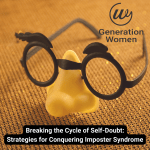Worry Makes the World Go Round: How to get out of the worry trap!
I had a party at the weekend, which was a great opportunity to catch up with friends I had barely seen all year. It’s after such events I wonder why I don’t see them more often, but life just has a habit of getting in the way, and before you know it, you’re getting ready for Christmas again! It was whilst having a good chat with one of the loveliest ladies I know, she shared how stressed out she’d been at work.
The stress wasn’t unfounded, but it struck me what a big role worrying was playing in how she was feeling. It was tough to hear the torment she was putting herself through, particularly over things that she had no control over. We had a good chat about it, and I received a lovely text in the morning as she was feeling better after our chat.
It got me to thinking about how we can be our own worst enemies, and how with a bit of help we can change how we think, which can have a massive impact on how we feel.
If you are a worrier, it’s likely you think ‘if I don’t worry, it will get worse’, or ‘if I worry at least I can prepare for the worst’, or ‘if I worry I might be able to stop it happening’. Whatever story you’re telling yourself to perpetuate the worry cycle, it is time to short-circuit it.
Why do we worry?
Worrying has a genetic factor (so thank your parents), and a nurture factor (again mum and dad), so you could be a born worrier, or circumstances like a divorce could have shaped you into one. The good news is that we can change our thought processes! The brain is infinitely rewireable, and though it takes a bit of effort and practise, it is definitely possible.
The world we currently live in, is one of delayed returns – we work today but get paid at the end of the month (unless self employed then who knows when!), yet our brain developed at a time of immediate returns…I’m hungry, let’s go hunt and forage for food. Our brains were designed to solve problems that get us immediate results. Unfortunately, the modern world isn’t like that. As a result, our mind doesn’t like loose ends, instead it craves answers, security, predictability. When we lived in an immediate environment, stress and anxiety were useful because they forced us to take action to manage our immediate problems.
What’s the problem?
Worrying is exhausting, it saps your energy to do it, and the consequences you are torturing yourself with are likely causing you to get stuck or at the very least are having a demotivating effect. The tension that comes with worrying, if it continues over a prolonged period can lead to stress. The impacts of this at a mild level can be anything from slower thinking, making mistakes, feeling uneasy to being unable to sleep and taking a long time to get over smaller illnesses like colds. So as we can see, worrying doesn’t just impact your mental health, it wreaks havoc physically too.
“Worriers are more likely to have irritable bowel syndrome, nausea,fatigue, and aches and pains…”
Robert Leahy (Author of Worry Cure: 7 Steps to Stop Worry From Stopping You)
When stress becomes chronic it impacts our temper, can lead to multiple issues such as depression, persistent ill health, and insomnia. It seems then, that:
Worry doesn’t change anything, except your health
As far as I know, most of us don’t have the ability to change the future, but there is a lot of evidence to support that we get more of what we focus on. With that in mind, then it’s a compelling reason to do something about it.
What can we do?
- Reframe worrying – this is thinking differently about your worrying. Here’s 2 belief changes that have helped me rethink the worrying part, use these or come up with your own:
- worrying is like wishing for the worst to happen
- the only thing worrying will change is your health (I’ll say it again in case you didn’t get it the first time)
- Reframe what you’re worrying about – for the better. One thing I noticed with my friend is she was really personalising the situation (which was reframing for the worse). This was partly because of her empathy, and I suspect her brain trying to make sense of it. The impact was really damaging her, and certainly impeding her ability to step back.
Here are questions to ask yourself that will help you with reframing:
- Is it personal? – mostly the answer to this is no. Are we making it personal? Quite likely!! One of my favourite thoughts is ‘what someone else thinks of you is none of your business’, so even if it feels personal, it likely isn’t. A bad situation at work, a fall-out with a friend even, quite often there are so many other factors at play that often it’s much less personal than we make it, such as other situations they’re dealing with, previous baggage etc. Taking something out of the personal box makes it much easier to detach from and much less emotive. In many situations this is going to make it easier for you, and help you make better decisions.
- Is it permanent? – when you can put a timeframe on something, it helps put a box around it, you’re taking away the enormity of it. Very few things in life are permanent. Feel the weight lift when you realise that is likely the case, and that in a week/ month/ year that this will likely be a distant memory.
- Is it pervasive? – or is it an impact in just one area of your life? When we allow things to leach into different areas of our life, then we are creating bigger problems for ourselves. Is it work, is it family, is it a specific issue…essentially your creating a smaller and smaller box around the issue. This doesn’t mean you’re minimising the issue, but you are minimising the impact.
What specifically can you do to contain the worry?
Take action
Focus on what you have influence over, not what you can do nothing about. We always feel better when we are doing something. Something bad may have happened, be it at home or at work. You can drive yourself insane thinking about what is outside of your hands, or you can figure out what you can do. Maybe you have a sick family member or friend, you can’t change their health, but you can spend time with them, make them dinner etc. What can you do?
Focus on immediate returns rather than longer term results
If you can tie one to the other and you’ve cracked it. As our brains are wired for immediate returns, it’s helpful to think in this way. It’s likely what you’re worrying about won’t be fixed by one action (otherwise you’d just take it). There may be smaller steps that can have an impact however. We may avoid taking those steps because we can’t see immediate returns in them. A simple way of thinking about this is thinking about exercising. Many of us may not bother because we can’t see immediate returns, but if we reframe it so the immediate return is an energy boost, rather than a healthy body (delayed return), it is more likely to cause us to act.
Stop catastrophising!!
This goes back to ‘worrying is like wishing for the worst to happen’. I know many of us almost enjoy the twisted pleasure of imaging the worst. Having arguments in our head that are never going to happen. What’s this doing for your stress levels though? And how often does the worst ever play out? This is a really pervasive type of stinking thinking, so in the words of Jim McDonald (Coronation Street character), catch yourself on and stop it!
A problem shared…
There’s a good reason for old sayings, they’re usually right!! Speaking to someone else allows many things to happen; you get out of your own head, you hear your own madness and struggle to rationalise it to someone else, which makes it harder to do to yourself, you get other perspectives on the issue, you may even get help! Get out there and speak to a friend, it will also likely help you realise it’s not that big an issue after all!
And if all else fails…
Tell yourself to shut the hell up and catch a grip (as they say here). Other people are managing much bigger issues, there’s always someone worse off! I’m not saying this to be harsh, but to give yourself a break, you deserve it!








Great article. Worry is about as effective as trying to solve a math equation by standing on your head. 🙂
Thanks Peter. Maybe that’s where I’ve been going wrong! Perhaps I require more yoga, lol